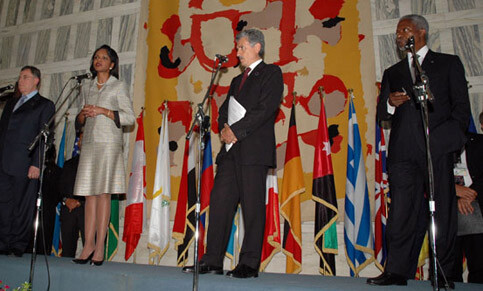United Nations News Service 26 July 2006

Secretary Rice with Lebanese Prime Minister Fuad Siniora, Italian Foreign Minister Massimo D’Alema and U.N. Secretary General Kofi Annan at Press Conference following the Lebanon Core Group Meeting, Italian Ministry of Foreign Affairs, Rome, July 26, 2006. (State Department/U.S. Embassy Rome)
Deploring the “horrendous and dangerous” situation in Lebanon, Secretary-General Kofi Annan today proposed a three-part strategy involving an immediate cessation of hostilities and wide-ranging political and economic commitments to solve a crisis that has killed hundreds of people and forced around 800,000 others to flee their homes.
“A cessation of hostilities, a political framework, the deployment of an international force, and agreement on a reconstruction programme would give us the beginnings of a way out of this crisis,” he told delegates at a high-level conference in Rome called to discuss the worsening situation.
“The death and destruction we have witnessed in the past two weeks, including yesterday’s tragic killing of UN peacekeepers, compels this conference to send a strong message, and to speak with one voice. We must say, to the people of Lebanon, to the people of Israel, to people throughout the wider Middle East, that we will do our utmost to help them find a path towards peace.”
During Mr. Annan’s address, delegates stood and observed a minute of silence for those killed, while afterwards the Secretary-General warned there remains “great potential” for further escalation in the conflict and that was why it was most urgent to have an immediate cessation of hostilities.
“I call on Hezbollah to stop its deliberate targeting of Israeli population centres. And I call on Israel to end its bombardments, blockades and ground operations. A temporary cessation of hostilities would offer crucial hours and days for essential humanitarian tasks, including the distribution of relief aid and the evacuation of non-combatants and the wounded.”
He said an international force would have a vital role to play, helping in the short-term with the humanitarian operation, but over the longer term assisting Lebanon’s Government in implementing various agreements and Security Council resolutions, particularly by helping it extend its authority and disarm all militias.
Mr. Annan acknowledged such a force could only operate with the consent of the Government and all “Lebanese parties.” The second part of his strategy calls for a political framework so that a cessation of hostilities can be transformed into “a longer-term process of enduring peace.”
“Such a framework should address several issues, including captives, delineation of Lebanon’s borders and a mechanism for monitoring and guaranteeing its implementation,” he said, while stressing that wider regional involvement was needed for any long-term solution.
“We must bring our best ideas together into a coherent, achievable package that all parties can endorse… And for solutions to last, it will also require the constructive engagement of the countries of the region, including Syria and Iran.”
Turning to the third part of this approach, he called on the conference to commit to a strong economic package for Lebanon because the conflict had seen years of painstaking reconstruction “undone with terrible speed,” and a donor framework was needed to secure funding.
The co-chairs of the Rome conference, whose participants included representatives from 14 countries as well as the European Union and the World Bank, expressed their determination in a statement “to work immediately to reach with the utmost urgency a ceasefire that put an end to the current violence and hostilities.”
“Calling Israel to exercise its utmost restraint, they welcomed Israel’s announcement of humanitarian corridors to Lebanon, including for humanitarian flights into Beirut International Airport, and within Lebanon that can allow for the rapid delivery of relief aid, and called for their immediate operation,” the statement read.
The conference called for an International Force to “urgently be authorized under a UN mandate to support the Lebanese Armed Forces in providing a secure environment,” and there was wide support for a meeting to discuss security assistance for the Lebanese forces.
Participants pledged their determination to provide immediate humanitarian relief and also agreed to the convening of an international donor conference to assist with the revival of Lebanon’s economy.
Related Links